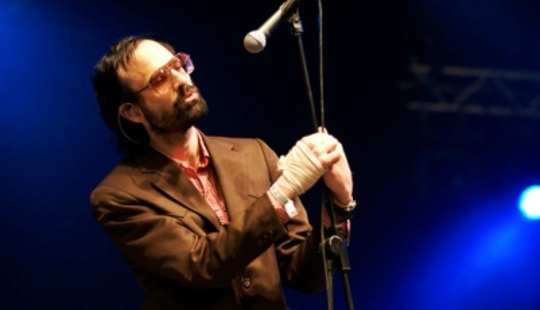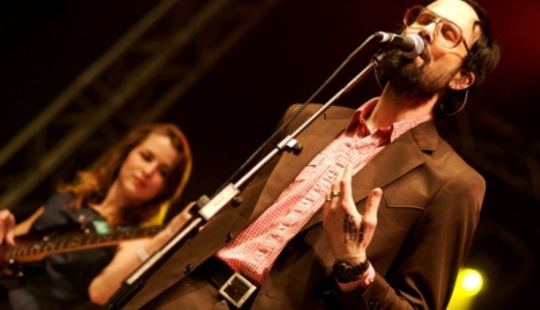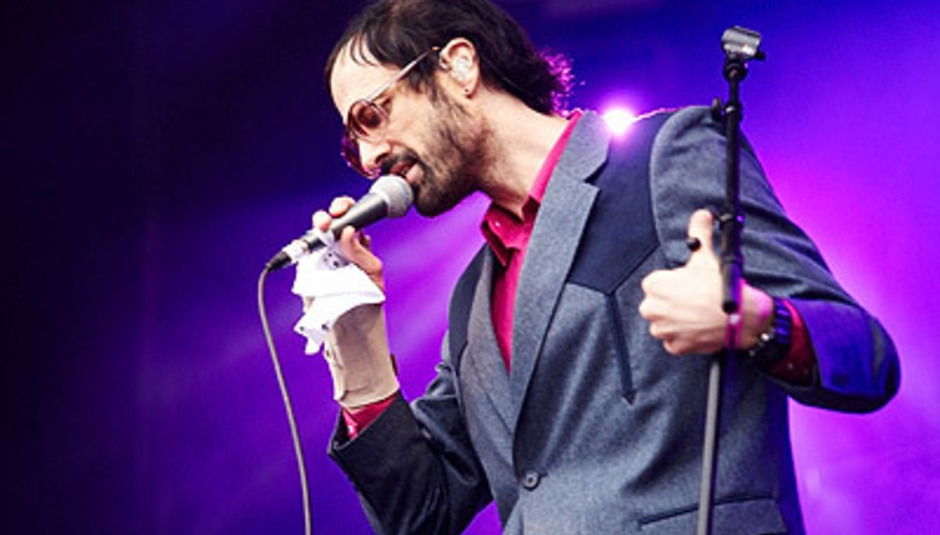David Berman is talking, DiS is listening. This is the way this interview works. The Silver Jews’ heart and soul – indeed, Berman is Silver Jews – knows his tangents and is sticking to them.
“It seems like a pyramid scheme, where they’re making money out of all of these people…”
I don’t remember how we got here, to talk of festivals, but we have. At the time of our conversation, Berman is yet to play sets – alongside band members including his wife Cassie on bass – at both ATP and Primavera Sound. He’s on his PR officer’s mobile, somewhere in London, ahead of a show at the capital’s Luminaire. His latest (sixth studio) LP, Lookout Mountain, Lookout Sea, is another critical hit. Festivals? Sorry, where are we…
“It’s another thing that replicates the asymmetrical band-man relationship that enables evermore bands to enjoy the unrealistic asymmetry… Y’know, like these days you can be 18 years old, in a band, and not have a dime, yet you’ll command the sort of reverence that no other occupation – not even if you’re an actor – can offer you. People will make way as they walk through a giant crowd – it’s a strange and unique position in society, a strange world.”
Video: 'Sleeping Is The Only Love'
- - -
Strange and unique: two adjectives that could be applied to Silver Jews, known to fans as ‘The Joos’. Forming in 1989 as a trio, Berman joining forces with Stephen Malkmus and Bob Nastanovich (both would later play in Pavement), Silver Jews’ first four albums were not supported with any touring. Acclaim was theirs for the taking, granted, but Berman was not one for life on the road. That changed in 2005 with the release of Tanglewood Numbers, the group’s fifth album recorded with the assistance of, among many others, Malkmus and Paz Lenchantin of A Perfect Circle and Zwan. To support the release Berman took his music overseas, playing Europe and Israel in 2006 as well as a number of dates in the States. Now, in 2008, he’s doing the same thing: bringing Lookout Mountain… to audiences demanding such shows since 1994’s Starlite Walker debut.
Not that they’re doing that many dates throughout the year…
“Usually I don’t like to keep a tour going, as it’s one of those roles that feels a little unseemly. If you stay in this role too long lightning will strike – it’s hard to develop humility momentum. You try to be as humble as you can be, and you find yourself in these other situations. As a husband, whose wife is in the band, I don’t want her to have that attitude. She’s younger, and after touring before years ago now I don’t absorb it as much as a younger person, I think. They can’t really handle it as well.”
How do you find touring with your wife?
“I guess if I’d chosen to tour without her it’d have been a drag, but because I chose monogamy it makes it easier. Being a married man with your wife on tour is pretty easy. Y’know, ‘What I’d do if I could’… you don’t have to deal with that. It takes away temptation.
“Y’know, like yesterday I had to tell her that she was essentially an employee of mine right now. She was so late getting to the airport, as she had to get this laptop to take on tour with us and she hadn’t taken it out of the box. So, she was late, and I told her that if I was her boss, and she was my employee, I’d probably be figuring out how to fire her. Nobody in the band is afraid of me because they’re my friends.”
Video: 'I'm Getting Back Into You'
- - -
The Silver Jews band, right now, is a collection of Berman’s friends; the same band toured album five and assembled to record album six. For maybe the first time ever, a Silver Jews LP sounds like a ‘proper’ band album, a record crafted by more than a single influencing individual. True, Berman’s role remains ringmaster, expert lyricist whose tales will forever engross – he’s a published poet as well as a performer in a musical field – but the involvement of those he’s chosen to surround himself with has never come through so clearly.
“It’d have been unfair to not have these people record the record. The basic tracking – which is the first thing you do in the studio – was so easy, not only because I’d been playing with the guys but also because they play with each other on different projects. And also, I don’t like to spend a lot of time practising, and these guys don’t need to. They’re able to do this Pitchfork live thing on the first take, and before we go into the studio they know I’m not gonna let them hear the songs or practise them too many times. That confidence, you don’t get that in a session musician’s attitude. They work things out amongst themselves.”
And are you likely to press on with this line-up?
“Maybe. I mean, I wasn’t fortunate enough to have ever experienced starting out with a band and sticking with them, so that would be interesting to me. People whose bands start out like that, when they break up it’s always terrible. Maybe this is a sort of solution to that – you don’t form the band until later, when you know what you want. People break up their bands because they grow older, everyone has new priorities, like marriage or something. People should start out as solo artists and slowly work towards a band – that way there won’t be any break-ups anymore and nobody will go through the bullshit that so many baby-boomers did over the Beatles in the ‘70s.
“Also, it’s interesting because I think the idea became an obvious way to work for me from watching the Royal Trux; a lot of the bands on Drag City just followed the Royal Trux model. There comes a time where people switch from a band name to their own name, and for me that might be tempting – Silver Jews hasn’t always been the easiest band name to have. I guess I could be tempted to do that, but I’ve never really thought about it. I have an investment in doing this series of things – I started this series, and it’s almost like The Hardy Boys or something, something that I liked as a kid. I want these records to be part of a bigger piece.”
Silver Jews at ATP, May 2008 (by Lucy Johnston)


- - -
The band’s latest, reviewed here, is as much a recipient of that vital critical praise as all that’s come before it. Berman had stated before its release that the band’s sixth would have a really different feel to the five that preceded it – it certainly has more of a country element to it than previous Joos albums – but that didn’t put journalists off their purple prose one iota. It makes one wonder, given he’s often had the press on his side, if the need to attract a positive reception with each release weighs at all heavy on Berman’s mind during the writing process.
“During the writing process I’m always doing the business of writing something down, getting out of my chair, figuratively, and going around the other side of the table to become the reader. I do this in my mind, constantly. But I definitely don’t have an agenda when I start out – what I’m trying to do is write some songs.
“This time I needed ten songs, and there were certain ideas – every song had to be about something, it couldn’t be abstract; it had to have concrete elements to it. And they also had to be of a various nature, to be written in first, second or third person. I also wanted to display a little bit of… Well, I guess I wanted… I have a very… I don’t know…
“I’ve always wanted there to be a sort of body of critics who would look at music the way that good film critics look at films and how art critics look at art, and I understand that most of the work of a music reviewer doesn’t sustain much close analysis – the pleasures of most good pop songs are often completely exterior, or these pleasures are pre-verbal or something. But I work like a poet, so I put a lot of meaning into everything I do, and on this album I even tried to put layers of meaning into individual songs. Sometimes I’m worried, as I can fly under critics’ radars if I’m not given a close reading – I’m not technically skilled, and I’m not a good singer. So I’m below the average person’s standards, but if I can make a person listen to what I’m saying, I have a better chance of winning their confidence.”
You consider your lyrical ability to be your primary strength as a musician?
It can be a strength, but it’s a weakness to degree that people aren’t looking for such things. There isn’t a premium placed on it – people don’t find themselves criticised for not being more ambitious about their writing. It’s something that nobody is calling for, but that I need to do or else I won’t be interested in it. It’s the way… I can only succeed in these certain areas. My whole life I’ve tried to find the thing I can do that other people can’t do, and invest in that, and the one thing I can do is write narratives and build characters. I can do that. That’s my way in.
“I guess when I was younger, I’d have assumed that in 2008 music would be full of great writers following in the tradition of the young great writers of the ‘60s and ‘70s, but it hasn’t turned out that way, or at least there are no other writers around that I look at and think: ‘Wow, I’m outclassed, I need to get out of this business’. It’s a real surprise to me – I’d have never thought there’d be space for me today, as I’d never planned on being a songwriter at this time. I just assumed that there would be people… I woke up in a world where people weren’t really writing songs about anything, so there is a place for me, and I’m amazed at that.”
Video: 'Smith & Jones' (live)
- - -
A place big enough for DiS readers to be coaxed into asking Berman some questions, that’s for sure. To finish our conversation, I ask a couple of posers as provided by you.
What sort of set list are you going to have for the 2008 tour dates, and will ‘The Wild Kindness’ be on it?
“That song we’re going to be playing. I haven’t worried about people who will come to more than one show this time – last time there was a lot of that, and I sensed it – and instead I’m doing the shows with half the new album and half, quote-unquote, ‘greatest hits’. Which I consider ‘The Wild Kindness’ to be on the edge of – it’s a fan favourite so I’ve brought it in. For the albums I did it like this – one song from the first, two from the second, three from the third and the fourth and fifth, so it’s one, two, three three three.”
Will there be a second volume of Actual Air, your book of poetry published in 1999?
“Y’know, there could be. The reason I’ve decided not to put one together so far is because I wait until I have something to offer. Another collection of poems now would be just like Actual Air 2. So I’m waiting for myself to start writing a different kind of poetry, which is funny because in music I’m quite happy using the same 16 chords over and over again. And in music, because of refrains and repetition and certain formal features, it can be gratifying… I ask myself when I see a new album: ‘Is this an album that they needed to make, or do they need to just keep making albums?’ Because they’re an institution, y’know. So I can see why anyone in the world would put out a first record, or a first book, but the second one, there should be a reason for. I’ve not found my reason for a second book yet.
“But, I think that in the fall I’m going to be putting stuff together. I have a literary agent, and I’m 41, and I’m not going to tour very much, so I think… I also thought there’d be more writers my age now that I liked, and there seems to be room for me in that area. I feel that maybe with this album I’ve had my run or something; I think it answers some of the questions posed by the other albums. I could really see… especially as people speculate about the future of music… I don’t really relish the idea of making an album that’s for sale in an abstract way, on a computer. So I always like to keep Silver Jews separate from other bands – I don’t do remixes or collaborations or compilations or all these things. For me, downloading is like a giant compilation of all the world’s music, and I guess I want to sit out of that compilation of that if I can.”
Silver Jews’ Lookout Mountain, Lookout Sea is out now on Drag City and is reviewed here. Find Silver Jews on MySpace here.
















